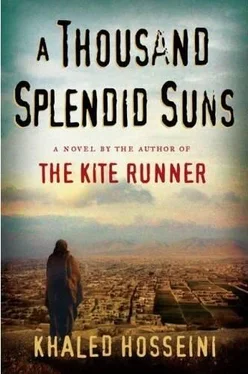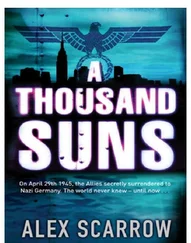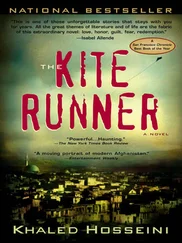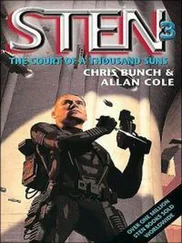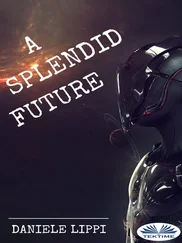"Have you been comfortable?" Nargis, who had a small chin and curly black hair, asked. "We hope you've been comfortable. This… ordeal… must be very hard for you. So difficult."
The other two nodded. Mariam took in their plucked eyebrows, the thin, tolerant smiles they were giving her. There was an unpleasant hum in Mariam's head. Her throat burned. She drank some of the water.
Through the wide window behind Jalil, Mariam could see a row of flowering apple trees. On the wall beside the window stood a dark wooden cabinet. In it was a clock, and a framed photograph of Jalil and three young boys holding a fish. The sun caught the sparkle in the fish's scales. Jalil and the boys were grinning.
"Well," Afsoon began. "I – that is, we – have brought you here because we have some very good news to give you."
Mariam looked up.
She caught a quick exchange of glances between the women over Jalil, who slouched in his chair looking unseeingly at the pitcher on the table. It was Khadija, the oldest-looking of the three, who turned her gaze to Mariam, and Mariam had the impression that this duty too had been discussed, agreed upon, before they had called for her.
"You have a suitor," Khadija said.
Mariam's stomach fell. "A what?" she said through suddenly numb lips.
"A khastegar. A suitor. His name is Rasheed," Khadija went on. "He is a friend of a business acquaintance of your father's. He's a Pashtun, from Kandahar originally, but he lives in Kabul, in the Deh-Mazang district, in a two-story house that he owns."
Afsoon was nodding. "And he does speak Farsi, like us, like you. So you won't have to learn Pashto."
Mariam's chest was tightening. The room was reeling up and down, the ground shifting beneath her feet.
"He's a shoemaker," Khadija was saying now. "But not some kind of ordinary street-side moochi, no, no. He has his own shop, and he is one of the most sought-after shoemakers in Kabul He makes them for diplomats, members of the presidential family – that class of people. So you see, he will have no trouble providing for you."
Mariam fixed her eyes on Jalil, her heart somersaulting in her chest. "Is this true? What she's saying, is it true?"
But Jalil wouldn't look at her. He went on chewing the corner of his lower lip and staring at the pitcher.
"Now he is a little older than you," Afsoon chimed in. "But he can't be more than… forty. Forty-five at the most. Wouldn't you say, Nargis?"
"Yes. But I've seen nine-year-old girls given to men twenty years older than your suitor, Mariam. We all have. What are you, fifteen? That's a good, solid marrying age for a girl." There was enthusiastic nodding at this. It did not escape Mariam that no mention was made of her half sisters Saideh or Naheed, both her own age, both students in the Mehri School in Herat, both with plans to enroll in Kabul University. Fifteen, evidently, was not a good, solid marrying age for them.
"What's more," Nargis went on, "he too has had a great loss in his life. His wife, we hear, died during childbirth ten years ago. And then, three years ago, his son drowned in a lake."
"It's very sad, yes. He's been looking for a bride the last few years but hasn't found anyone suitable."
"I don't want to," Mariam said. She looked at Jalil. "I don't want this. Don't make me." She hated the sniffling, pleading tone of her voice but could not help it.
"Now, be reasonable, Mariam," one of the wives said.
Mariam was no longer keeping track of who was saying what. She went on staring at Jalil, waiting for him to speak up, to say that none of this was true.
"You can't spend the rest of your life here."
"Don't you want a family of your own?"
"Yes. A home, children of your own?"
"You have to move on."
"True that it would be preferable that you marry a local, a Tajik, but Rasheed is healthy, and interested in you. He has a home and a job. That's all that really matters, isn't it? And Kabul is a beautiful and exciting city. You may not get another opportunity this good."
Mariam turned her attention to the wives.
"I'll live with Mullah Faizullah," she said. "He'll take me in. I know he will."
"That's no good," Khadija said. "He's old and so…" She searched for the right word, and Mariam knew then that what she really wanted to say was He's so close. She understood what they meant to do. You may not get another opportunity this good. And neither would they. They had been disgraced by her birth, and this was their chance to erase, once and for all, the last trace of their husband's scandalous mistake. She was being sent away because she was the walking, breathing embodiment of their shame.
"He's so old and weak," Khadija eventually said. "And what will you do when he's gone? You'd be a burden to his family."
As you are now to us. Mariam almost saw the unspoken words exit Khadija's mouth, like foggy breath on a cold day.
Mariam pictured herself in Kabul, a big, strange, crowded city that, Jalil had once told her, was some six hundred and fifty kilometers to the east of Herat. Six hundred and fifty kilometers. The farthest she'd ever been from the kolba was the two-kilometer walk she'd made to Jalil's house. She pictured herself living there, in Kabul, at the other end of that unimaginable distance, living in a stranger's house where she would have to concede to his moods and his issued demands. She would have to clean after this man, Rasheed, cook for him, wash his clothes. And there would be other chores as well – Nana had told her what husbands did to their wives. It was the thought of these intimacies in particular, which she imagined as painful acts of perversity, that filled her with dread and made her break out in a sweat.
She turned to Jalil again. "Tell them. Tell them you won't let them do this."
"Actually, your father has already given Rasheed his answer," Afsoon said. "Rasheed is here, in Herat; he has come all the way from Kabul. The nikka will be tomorrow morning, and then there is a bus leaving for Kabul at noon."
"Tell them!" Mariam cried
The women grew quiet now. Mariam sensed that they were watching him too. Waiting. A silence fell over the room. Jalil kept twirling his wedding band, with a bruised, helpless look on his face. From inside the cabinet, the clock ticked on and on.
"Jalil jo?" one of the women said at last.
Jalil's eyes lifted slowly, met Mariam's, lingered for a moment, then dropped. He opened his mouth, but all that came forth was a single, pained groan.
"Say something," Mariam said.
Then Jalil did, in a thin, threadbare voice. "Goddamn it, Mariam, don't do this to me," he said as though he was the one to whom something was being done.
And, with that, Mariam felt the tension vanish from the room.
As Jalil's wives began a new – and more sprightly – round of reassuring, Mariam looked down at the table. Her eyes traced the sleek shape of the table's legs, the sinuous curves of its corners, the gleam of its reflective, dark brown surface. She noticed that every time she breathed out, the surface fogged, and she disappeared from her father's table.
Afsoon escorted her back to the room upstairs. When Afsoon closed the door, Mariam heard the rattling of a key as it turned in the lock.
In the morning, Mariam was given a long-sleeved, dark green dress to wear over white cotton trousers. Afsoon gave her a green hijab and a pair of matching sandals.
She was taken to the room with the long, brown table, except now there was a bowl of sugar-coated almond candy in the middle of the table, a Koran, a green veil, and a mirror. Two men Mariam had never seen before – witnesses, she presumed – and a mullah she did not recognize were already seated at the table.
Читать дальше
